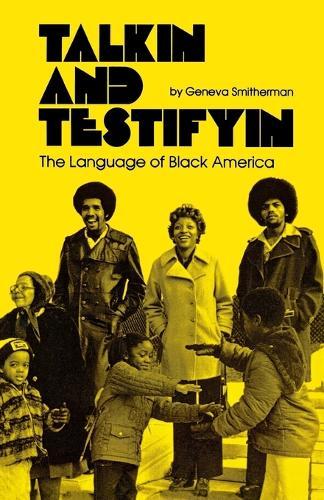Overview
In her book, Geneva Smitherman makes a substantial contribution to an understanding of Black English by setting it in the larger context of Black culture and life style. In addition to defining Black English, by its distinctive structure and special lexicon, Smitherman argues that the Black dialect is set apart from traditional English by a rhetorical style which reflects its African origins. Smitherman also tackles the issue of Black and White attitudes toward Black English, particularly as they affect educational policy. Documenting her insights with quotes from notable Black historical, literary and popular figures, Smitherman makes clear that Black English is as legitimate a form of speech as British, American, or Australian English.
Full Product Details
Author: Geneva Smitherman
Publisher: Wayne State University Press
Imprint: Wayne State University Press
Edition: New edition
Dimensions:
Width: 13.70cm
, Height: 2.20cm
, Length: 21.60cm
Weight: 0.438kg
ISBN: 9780814318058
ISBN 10: 0814318053
Pages: 298
Publication Date: 31 January 1986
Audience:
College/higher education
,
General/trade
,
Undergraduate
,
General
Format: Paperback
Publisher's Status: Active
Availability: Manufactured on demand

We will order this item for you from a manufactured on demand supplier.
Reviews
A full view of the Afro-Caribbean history that illuminates the special evolution of the Black Vernacular in America.--William Labov Professor of Linguistics, University of Pennsylvania An important milestone in our understanding of the richness and sophistication of language and language use among Black Americans.--Orlando L. Taylor Acting Dean, School of Communications, Howard University
A full view of the Afro-Caribbean history that illuminates the special evolution of the Black Vernacular in America.--William Labov Professor of Linguistics, University of Pennsylvania An important milestone in our understanding of the richness and sophistication of language and language use among Black Americans.--Orlando L. Taylor Acting Dean, School of Communications, Howard University
"A full view of the Afro-Caribbean history that illuminates the special evolution of the Black Vernacular in America.--William Labov ""Professor of Linguistics, University of Pennsylvania"" An important milestone in our understanding of the richness and sophistication of language and language use among Black Americans.--Orlando L. Taylor ""Acting Dean, School of Communications, Howard University"""
An important milestone in our understanding of the richness and sophistication of language and language use among Black Americans. --Orlando L. Taylor ""Acting Dean, School of Communications, Howard University""
In this celebration of Black English, Smitherman examines its strengths and urges its use in beginning reading programs for young children. Following Dillard's lead, she defends black speech patterns and styles, too often dismissed by whites as substandard or unsystematic, and uses the works of Langston Hughes, Richard Wright, and others to document the richness and vitality of black dialect. She finds in the Dozens and other modes of discourse logical extensions of African oral traditions and sees in the early attraction to and acceptance of the church an adaptation of the African world view. Writing in standard white English, using black English for emphasis, Smitherman (Speech Communication, Wayne State) cites a wide variety of sources ( I mean, really, it seem like everybody and they momma done had something to say on the subject! ) and then introduces her own recommendations in a final chapter on educational practices. Charging that the imposition of white English on black children makes excessive demands ( they must learn to be switch hitters ), she suggests a reading/language program which accommodates not deficiencies but actualities, ultimately aiming for fluency in both dialects. Her solution is wholly reasonable to anyone who's seen a black six-year-old (or sixteen-year-old) struggle with white English inflections but it overlooks several important problems (non-blacks in the class, variations in black dialect) and rather naively looks to the individual teacher as an agent of social change. A jivey, feisty text, with evidence drawn from Chinua Achebe, Aretha Franklin, and streetcorner conversations. (Kirkus Reviews)
Author Information
Geneva Smitherman a distinguished professor emerita and director of the African American Language and Literacy Program at Michigan State University.




